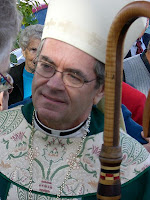No wonder Oregon Catholics are confused. With the welcome of Bishop Remi De Roo his lack of Truth to so many basic Church issues shows the disdain that the Archdiocese of Portland has for Rome and the Holy Father.
Retired Canadian Bishop Remi De Roo is also a teacher of the Enneagram, a gnostic way of thinking, very heady. There is only one True Teacher we need..there are endless lessons to learn and we are still in Spiritual pre-school in this Archdiocese.
Disgraced Canadian prelate recounts heated exchanges with two popes.
 VICTORIA, British Columbia, Nov. 8th, 2012 (LifeSiteNews.com) – The former Bishop of Victoria, Remi De Roo, has published a book of memoirs in which he relates two heated exchanges with Pope John Paul II and future-pope Cardinal Ratzinger over his divergences from Roman Catholic teaching.
VICTORIA, British Columbia, Nov. 8th, 2012 (LifeSiteNews.com) – The former Bishop of Victoria, Remi De Roo, has published a book of memoirs in which he relates two heated exchanges with Pope John Paul II and future-pope Cardinal Ratzinger over his divergences from Roman Catholic teaching.Appointed Bishop of Victoria in 1962 at the age of 38, the 88-year-old De Roo has been one of Canada’s leading promoters of a “progressive” interpretation of Vatican II as one of the country’s last surviving Council fathers. He was the leading voice against Pope Paul VI’s Humanae vitae among Canada’s bishops, and has since traveled across North America for years giving talks as a “pilgrim of Vatican II.”
In Chronicles of a Vatican II Bishop, published in September by Novalis, De Roo recounts that he was called to Rome for a meeting with Cardinal Joseph Ratzinger (now Pope Benedict XVI) over his advocacy of the female priesthood in a 1986 talk in Washington, D.C.
“This was not to be a joyous encounter,” he writes, according to the Western Catholic Reporter. “I was not alone in finding it galling to be treated like an errant schoolboy on what was supposed to be my ‘home turf.’”
He also recalls provoking a tense exchange with Pope John Paul II over the priesthood for married men as he and other bishops enjoyed a luncheon in the Pontiff’s dining room. He writes:
We were enjoying an open discussion of all sorts of topics. I was determined that one of them would be the ordination of mature married men. I was sitting next to the Pope, at his right hand. He attacked his food with gusto, pausing occasionally to hold his fork and knife upright in his hands. At one point, I suggested that we might consider the pastoral problems caused by the shortage of priests, particularly in remote areas like the ones represented by most of the bishops who were present at that luncheon.
Bishop De Roo’s memoirs include a foreword by Cardinal Jean-Claude Turcotte, who retired as head of the Archdiocese of Montreal in March after twenty-two years.He ignored my request by glancing to his left. The exchanges moved along; I waited for a second opportunity for a lull in the conversation. This time, speaking in French to make sure he would grasp every word, I carefully but directly faced him with the issue of our people being deprived of the Eucharist. Should we not call to ordination mature married men who could provide the spiritual nourishment that was so sorely lacking in areas deprived of clergy? He turned and glared at me, then banged deliberately on the table with his fist holding the knife handle. In a loud and emphatic tone of voice he declared, “Deus providebit!” (God will provide!). That was, sadly, the end of the exchange.
In his essay Tragedy at Winnipeg, Msgr. Vincent Foy relates that as the bishops prepared the disastrous Winnipeg Statement at the Fort Gary Hotel in September of 1968, it was Bishop De Roo above all who held out for the “right of freedom to follow conscience” in the contraceptive act, in contradiction to the pope’s reiteration of Catholic teaching that the act was intrinsically evil.
The Winnipeg Statement was the Canadian Catholic bishops’ official response to the publication Humanae Vitae.
He retired as Bishop of Victoria in 1999 after 37 years, but met disgrace a year later after it was revealed he had nearly bankrupted the diocese over failed investments in U.S. real estate, for which he had failed to obtain the requisite approval from the Vatican.
(VOCAL: check about the money. It could be cleared up..but that's the only thing.)




.jpg)



